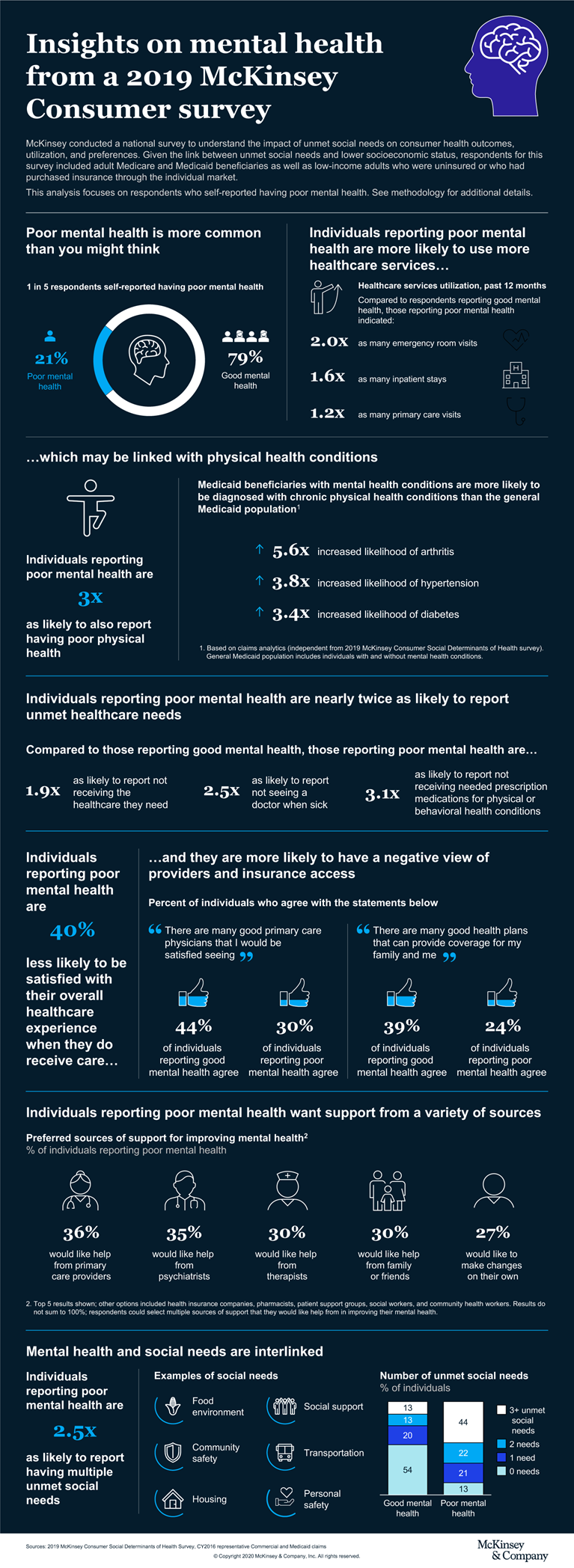
Methodology
Overview:
McKinsey conducted a national survey to understand consumer health outcomes, utilization, and preferences as well as the impact of unmet social needs. This analysis focuses on the population who self-reported having poor mental health.
Survey details and population: Survey findings in this document are based on responses to the 2019 McKinsey Consumer Social Determinants of Health Survey. The survey was fielded in December 2018. Respondents included US residents between the ages of 18–84 and were uninsured or had health insurance coverage through Medicare, Medicaid, or an individual market plan. Respondents who had individual market plans or were uninsured were limited to those with household incomes at or below 250 percent of the federal poverty level. Individuals with employer-sponsored health insurance were excluded. Results are shown for a nationally representative weighted subset of 2,010 respondents.
Mental health:
For this infographic, we grouped individuals by self-reported mental health status, rather than by whether the respondents reported receiving treatment for at least one mental health condition, in order to represent the consumers’ perspective of their own mental health. This approach also helps to mitigate the fact that some individuals with poor mental health may not receive treatment due to stigma or access challenges.
Survey participants were asked to rate their own mental health on a 5 point scale. Respondents reporting good mental health were defined as those who selected one of the top three options. Respondents reporting poor mental health were defined as those who selected one of the bottom two options. Twenty-one percent of respondents were defined as reporting poor mental health, which is in line with the 28 percent of respondents who reported receiving treatment for at least one mental health condition. Sixty-nine percent of individuals reporting poor mental health reported receiving treatment for at least one mental health condition, as did 17 percent of individuals reporting good mental health.
This approach is limited in that many individuals with mental illness may not recognize that they have a mental illness, and that some individuals may choose not to self-report or may overestimate their own mental health due to the stigma of having poor mental health. However, this survey’s finding that 21 percent of respondents self-reported poor mental health is in range of other publicly reported incidence rates of mental health conditions.1 Additionally, the survey’s guaranteed anonymity may have helped to mitigate stigma concerns.
Physical health:
Survey participants were asked to rate their own physical health. Respondents with good physical health were defined as those who those who selected one of the top three options. Respondents reporting poor physical health were defined as those who those who selected one of the bottom two options.
Social needs:
Impact of food security, community safety, personal safety, housing security, social support, and transportation access were defined per the methodology below. Respondents reporting an unmet social need were defined as those who were considered to be adversely impacted by the social factor.
- Food environment: Considered to be adversely impacted by food security if they have “very low food security” or “low food security,” using questions and methodology from the USDA’s screening tool to assess household food security. Methodology uses US Household Food Security Survey Questions, USDA.
- Community safety: Considered to be adversely impacted by community safety if they reported low-scoring responses to questions about general feelings about their community (e.g., whether people in the community take care of each other), concerns about community crime (e.g., worries about theft or assaults), and perceptions of community problems (e.g., presence of litter, abandoned buildings, noise violations) and crime indicators.
- Personal safety: Considered to be adversely impacted by personal safety if they reported needing medical care due to physical violence or indicated being afraid of a partner or co-resident.
- Housing: Considered to be adversely impacted by housing if they indicated that they do not have housing or have housing but are worried about losing it.
- Social support: Considered to be adversely impacted by social support if they reported low-scoring responses to questions about emotional and social loneliness, and about availability of emotional and physical social support (e.g., sources of emotional strength, help with practical activities).
- Transportation: Considered to be adversely impacted by transportation if they indicated that transportation has kept them from work, meetings, or getting things needed for daily living, or that it takes 60 minutes or longer to get to a doctor’s appointment.
Claims analyses:
For analyses conducted using claims data, mental health conditions were defined using a proprietary code list that includes mental illnesses (including mild conditions such as anxiety or depression as well as more severe conditions such as schizophrenia) and substance use disorders (such as opioid use disorder, alcohol use disorder, etc.). These analyses did not include data from the 2019 McKinsey Consumer Social Determinants of Health Survey.